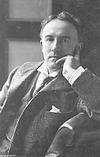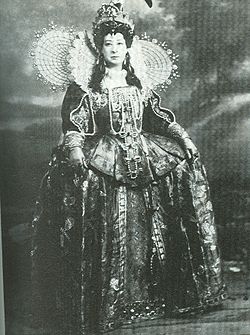- Merrie England (opera)
-
Operas by Edward German 
The Rival Poets (1901)
The Emerald Isle (1901) with Sullivan
Merrie England (1902)
A Princess of Kensington (1903)
Tom Jones (1907)
Fallen Fairies (1909)Merrie England is an English comic opera in two acts by Edward German to a libretto by Basil Hood. The patriotic story concerns love and rivalries at the court of Queen Elizabeth I, who is portrayed as jealous of the affection of Sir Walter Raleigh for Bessie Throckmorton. Its sunny depiction of England under "Good Queen Bess" has been criticized.[who?] The best-known songs from the opera are "O peaceful England", "The Yeomen of England" and "Dan Cupid hath a Garden".
It opened at the Savoy Theatre in London on 2 April 1902, under the management of William Greet, and ran for 120 performances, closing on 30 July 1902. The piece then toured while the Kitty Loftus Company played at the Savoy. The production reopened at the Savoy on 24 November 1902 for 56 additional performances, ending on 17 January 1903. It starred Henry Lytton, Louie Pounds, Rosina Brandram, Robert Evett and Walter Passmore, among other regulars of the Savoy.[1] A 78rpm recording of selections from the piece was made in 1931 on the Columbia label, with Clarence Raybould conducting "Under the Supervision" of the composer.[2]
The opera became popular and was often performed by amateur groups in the decades following its premiere. In Queen Elizabeth II's coronation year, over five hundred amateur societies staged the piece. Despite its lively and accessible music and libretto, it has fallen into relative obscurity in recent decades, although anniversaries such as that of the Armada in 1988 have seen revivals. Individual songs from Merrie England have been recorded many times although a complete professional recording has not been made in the UK since the early 1960s.
Contents
Background
 Rosina Brandram as Queen Elizabeth I
Rosina Brandram as Queen Elizabeth I
Basil Hood's libretto makes heavy use of wordplay for comic (and dramatic) effect. For example the homophones 'fore' and 'four' are used in a scene in the second act where it is explained that a dragon has "four legs, two of which are hind legs and two of which are fore legs" (compare this with the famous 'orphan'/'often' exchange in Act one of The Pirates of Penzance, by Gilbert and Sullivan).
The poem in Act one giving the A to Z of Romeo and Juliet is a particularly fine example of Hood's writing, summarising the plot of Romeo and Juliet through use of the alphabet. The plot, a rustic, romanticised Tudor story, has been criticised for containing too many unimportant characters and historical inaccuracy. It concerns love and rivalries at the court of Queen Elizabeth I, a monarch jealous of Sir Walter Raleigh's affection for Bessie Throckmorton, revealed to her by the Earl of Essex.
The music is an example of the style of English light opera made famous in the 1870s and 1880s by Gilbert and Sullivan. It features a prominent chorus and a range of principal numbers including ballads, patter songs, duets and quintets. German had gained a lot of practical knowledge about style and orchestration from completing Arthur Sullivan's score for The Emerald Isle, and he put this into practice in Merrie England, which was his own first large-scale work for the stage.
German's engaging score, evoking the colourful Tudor period, combined pomp and ceremony with ballads and romantic arias. It includes the well known song for the Queen "O peaceful England" and the stirring "Yeomen of England", which became a favourite and was performed at Queen Elizabeth II's Jubilee celebrations in 2002.
Roles
Role Voice type Premiere Cast,
(Conductor: Hamish MacCunn)Sir Walter Raleigh tenor Robert Evett The Earl of Essex bass Henry A. Lytton Walter Wilkins, a player in Shakespeare's Company baritone Walter Passmore Silas Simkins, another Player baritone Mark Kinghorne Long Tom, Royal Forester baritone E. Torrence Big Ben, Royal Forester bass R. Compton The Queen's Fool George Mudie, Jnr A butcher bass Powis Pinder A baker tenor J. Boddy A tinker baritone Rudolf Lewis A tailor tenor Robert Rous A lord baritone Charles Childerstone A soldier Lewis Campion First royal page L. Emery Second royal page Ela Q. May Bessie Throckmorton soprano Agnes Fraser "Jill-All-Alone" mezzo-soprano Louie Pounds Queen Elizabeth contralto Rosina Brandram The May Queen mezzo-soprano Joan Keddie Marjory W. Hart Dyke Kate contralto Alice Coleman Lady in waiting Rose Rosslyn Chorus of lords, ladies, townsfolk, and soldiers Synopsis
Two versions of the plot exist: Hood's original from 1902 and a revised one by Dennis Arundell presented at Sadler's Wells in 1960. The opera is set in Windsor Town and makes frequent reference to mythology and folklore (Robin Hood, King Neptune, St. George and the Dragon and witchcraft).
Act One
During the May Day festival, the May Queen is crowned with "roses white and roses red ... the flowers of Merrie England". Her two guards are introduced - Long Tom and Big Ben - who are brothers identical in all but one thing. The "little difference between them" is that Big Ben (like the other men in Windsor) loves the May Queen, while Long Tom loves Jill (known as Jill-All-Alone). Jill is accused of being a witch by the jealous May Queen and is shunned by the townsfolk.
Bessie Throckmorton, one of Queen Elizabeth's Ladies in Waiting, and Sir Walter Raleigh are in love, but they must keep their love a secret as the Queen is also in love with Raleigh. Bessie tells of how she carelessly lost a love letter from Raleigh ("She lost the letter from her love"). She worries that the letter may have fallen into Queen Elizabeth's hands and thus reveal their secret love. The Earl of Essex (Raleigh's rival for the affection of the Queen) is handed the love letter (an acrostic on the name Bessie) by Jill-All-Alone and plans to use it to dispose of Raleigh. Walter Wilkins, a travelling actor, appears and argues that any play can be vastly improved by the addition of song ("if it's played on a big brass band") and claims that "that's where [he] and Shakespeare disagree."
Queen Elizabeth then enters with much ceremony. Long Tom pleads for the Queen's protection of Jill-All-Alone from the townsfolk's persecution. Asking her whether she believes she is a witch, she replies with the paradox that if she were a witch she must know more than the townfolk, therefore she can't be a witch as she would know (as the townsfolk seem to) that she is a witch if she were. She declares that love will pass the queen by. This insult angers the Queen, and she joins with the villagers in condemning Jill as a witch, locking her away in the Tower of London for witchcraft. Essex hands the Queen Raleigh's love letter, which she initially mistakes to be meant for her. Raleigh gallantly admits that the letter is in fact meant for Bessie Throckmorton. The Queen is so incensed that she banishes Raleigh from Court and imprisons Bessie in Windsor Castle.
Act Two
Jill has managed to escape with Bessie using a secret passage out of the tower. The Queen asks an apothecary (her jester in disguise) to concoct a poison which she will administer to Bessie.
Wilkins works at length on a stage version of the story of St. George and the Dragon, and the play is performed for the Queen and Essex. Unfortunately, they dislike the play.
Eventually the Queen is convinced to allow Raleigh and Bessie to love each other, choosing Essex instead for herself after seeing an apparition of Herne the Hunter, who, according to legend, appears only when a sovereign contemplates a crime. Everyone takes part in a reenactment of Robin Hood's wedding to Maid Marian. Everyone takes roles closely related to their part in the opera; for example, Raleigh becomes Robin to Bessie's Marian.
Musical numbers
- Introduction (Includes "Hey, Jolly Robin", the Rustic Dance, and the Jig)
Act I
- 1. "Sing A Down, A Down, A Down" (Chorus with May Queen and Butcher)
- 2. "We Are Two Proper Men" (Long Tom and Big Ben with Chorus)
- 3. "Oh! Where The Deer Do Lie" (Jill with Chorus)
- 4. "I Do Counsel That Your Playtime" (Wilkins with Chorus)
- 5. "That Every Jack Should Have A Jill" (Raleigh with Chorus)
- 6. "Love Is Meant To Make Us Glad" (May Queen, Kate, Raleigh, Wilkins, and Long Tom)
- 7. "She Had A Letter From Her Love" (Bessie)
- 8. "When True Love Hath Found A Man" (Raleigh and Bessie)
- 9. "When A Man Is A Lover" (Wilkins, Simkins, and Essex)
- 10. "Who Were The Yeomen Of England, The Yeomen of England" (Essex with Chorus)
- 11. Entrance Of Queen Elizabeth/"God Save Elizabeth" (Chorus)
- 12. "O Peaceful England" (Elizabeth with Chorus)
- 13. "King Neptune Sat On His Lonely Throne" (Wilkins with Chorus)
- 14. Finale (Ensemble)
Act II
- 15. "The Month o' May Has Come Today" (Chorus with Jill)
- 16. "In England, Merrie England" (Bessie, Jill, Big Ben, Long Tom)
- 17. "The Sun in the Heaven Is High" (Simkins, the Tailor, and the Butcher with Chorus)
- 18. "The Big Brass Band" (Wilkins and Simkins with Chorus)
- 19. "It Is the Merry Month of May" (Jill and Raleigh)
- 20. "The Queen o' May Is Crowned Today" (Chorus)
- 20a. Rustic Dance
- 21. "Dan Cupid Hath a Garden" (Raleigh)
- 22. "Two Merry Men a-Drinking" (Ensemble)
- 22a. Exit of Chorus
- 23. "O Who Shall Say That Love Is Cruel?" (Bessie)
- 24. "When Cupid First This Old World Trod" (Essex with Bessie, Jill, and Raleigh)
- 25. "Perhaps You Don't Imagine" (Wilkins)
- 26. Masque of St. George and the Dragon (Egyptian Dance)
- 27. "Oh! Here's a To-Do to Die To-day" (Chorus with Wilkins as King)
- 28. Finale (Ensemble)
References
- ^ "Merrie England Programme" at The Gilbert and Sullivan Archive, accessed 19 October 2010
- ^ "Edward German: Merrie England", Internet Archive, accessed 19 November 2010
External links
- Merrie England at The Edward German Discography
- Merrie England at the Gilbert and Sullivan Archive
- Libretto
- Opening night review of the opera[dead link]
- Review of a recording of the opera Raymond Walker, retrieved on 24 July 2006
- Profile of the opera with photographs of the Sadler's Wells production
- Programme from the original production
- Photos from a 1911 production
Categories:- Operas by Edward German
- English-language operas
- English comic operas
- Operas
- 1902 operas
- Operas set in England
Wikimedia Foundation. 2010.
